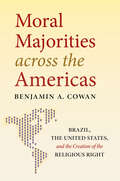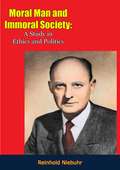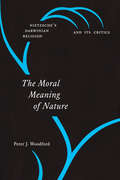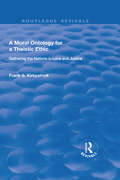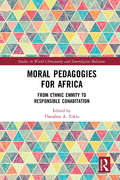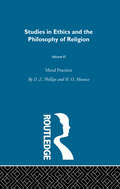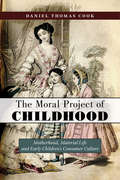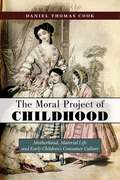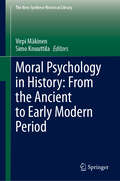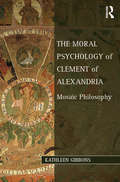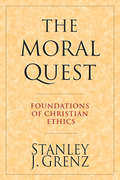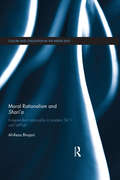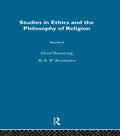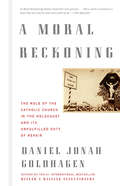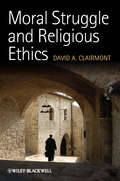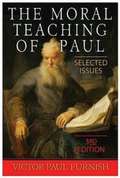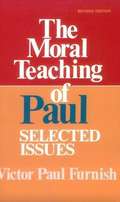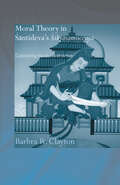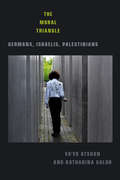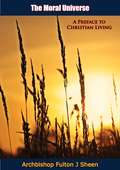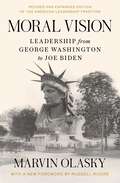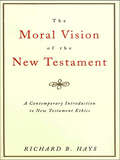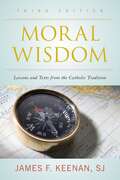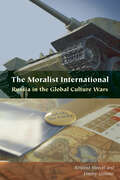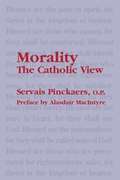- Table View
- List View
Moral Majorities across the Americas: Brazil, the United States, and the Creation of the Religious Right
by Benjamin A. CowanThis new history of the Christian right does not stop at national or religious boundaries. Benjamin A. Cowan chronicles the advent of a hemispheric religious movement whose current power and influence make headlines and generate no small amount of shock in Brazil and the United States. These two countries, Cowan argues, played host to the principal activists and institutions who collaboratively fashioned the ascendant religious conservatism of the late twentieth century. Cowan not only unearths the deep historical connections between Brazilian and U.S. religious conservatives but also proves just how essential Brazilian thinkers, activists, and institutions were to engendering right-wing political power in the Americas.Cowan shows that both Protestant and Catholic religious warriors began to commune in the 1930s around a passionate aversion to mainstream ecumenicalism and moderate political ideas. Brazilian intellectuals, politicians, religious leaders, and captains of industry worked with partners at home and in the United States to build a united right. Together, activists engaged in a series of reactionary theological discussions. Their transnational, transdenominational platform fostered a sense of common cause and allowed them to develop a series of strategies that pushed once marginal ideas to the center of public discourse, reshaped religious demographics, and effected a rightward shift in politics across two continents.
Moral Man and Immoral Society: A Study in Ethics and Politics (Library of Theological Ethics Ser.)
by Reinhold NiebuhrMoral Man and Immoral Society, first published in 1932, is Reinhold Niebuhr’s important study in ethics and politics. Forthright and realistic, it discussed the inevitability of social conflict, the brutal behaviour of human collectives of every sort, the inability of rationalists and social scientists to even imagine the realities of collective power, and, ultimately, how individual morality can overcome social immorality.“Every thinking Christian must squarely face the major thesis of this book, or confess the impotence of his faith for a day when the dawn is lowering red.”—The Christian Century“No one can read it without gaining great value.”—Annals of the American Academy of Political and Social Science
The Moral Meaning of Nature: Nietzsche’s Darwinian Religion and Its Critics
by Peter J. WoodfordWhat, if anything, does biological evolution tell us about the nature of religion, ethical values, or even the meaning and purpose of life? The Moral Meaning of Nature sheds new light on these enduring questions by examining the significance of an earlier—and unjustly neglected—discussion of Darwin in late nineteenth-century Germany. We start with Friedrich Nietzsche, whose writings staged one of the first confrontations with the Christian tradition using the resources of Darwinian thought. The lebensphilosophie, or “life-philosophy,” that arose from his engagement with evolutionary ideas drew responses from other influential thinkers, including Franz Overbeck, Georg Simmel, and Heinrich Rickert. These critics all offered cogent challenges to Nietzsche’s appropriation of the newly transforming biological sciences, his negotiation between science and religion, and his interpretation of the implications of Darwinian thought. They also each proposed alternative ways of making sense of Nietzsche’s unique question concerning the meaning of biological evolution “for life.” At the heart of the discussion were debates about the relation of facts and values, the place of divine purpose in the understanding of nonhuman and human agency, the concept of life, and the question of whether the sciences could offer resources to satisfy the human urge to discover sources of value in biological processes. The Moral Meaning of Nature focuses on the historical background of these questions, exposing the complex ways in which they recur in contemporary philosophical debate.
A Moral Ontology for a Theistic Ethic: Gathering the Nations in Love and Justice (Routledge Revivals Ser.)
by Frank G. KirkpatrickThis title was first published in 2003. This book develops a moral ontology for a theistic ethic that engages the work of contemporary moral and political philosophers, and reaffirms the relevance of a theistic tradition of God's relation to the world reflected in the fundamental teachings of Judaism, Christianity and Islam. Drawing on recent thought in the non-religious fields of psychology and political and moral philosophy, which build around the concept of human flourishing in community, Kirkpatrick argues that a theistic ethic need not be the captive of parochial or sectarian theological camps. He proposes a common or universal ethic that transcends the fashionable ethnocentric 'incommensurate differences' in morality alleged by many post-modern deconstructionists. In the wake of ethnic religious strife post September 11th 2001, this book argues for a common morality built on the inclusivity of love, community, and justice that can transcend sectarian and parochial boundaries.
Moral Pedagogies for Africa: From Ethnic Enmity to Responsible Cohabitation (Studies in World Christianity and Interreligious Relations)
by Theodros A. TekluThis volume engages with issues of moral responsibility and multiethnic co-existence in the context of contemporary Africa. Post-colonial African states are by and large ethnically diverse. Constructively managing ethnic diversity, however, has always been a challenge to these states, which often fail to be democratic and all-inclusive. As a result, ethnic enmity and conflicts that obliterate bonds of togetherness between ethnic communities have been rampant throughout the continent. In dialogue with Africa’s cultural and religious assets, this interdisciplinary multi-authored book aims at articulating the need to interpret past and present ethnic hostilities in Africa, and generating moral resources of togetherness to foster a social pedagogy of responsible cohabitation for Africans. The chapters of this volume, categorized into two parts, are framed according to these two niches.
Moral Practices Vol 6
by D.Z. Phillips H.O. MounceThis is Volume VI of nine in a collection of studies in Ethics and the Philosophy of Religion. Originally published in 1970, this volume looks at moral practices and the question which has puzzled philosophers: whether any value judgement can follow logically from the facts, can follow in such a way that someone who assents to the facts is bound in logic to assent also to the value judgement based upon them.
The Moral Project of Childhood: Motherhood, Material Life, and Early Children's Consumer Culture
by Daniel Thomas CookExamines the Protestant origins of motherhood and the child consumer Throughout history, the responsibility for children’s moral well-being has fallen into the laps of mothers. In The Moral Project of Childhood, the noted childhood studies scholar Daniel Thomas Cook illustrates how mothers in the nineteenth-century United States meticulously managed their children’s needs and wants, pleasures and pains, through the material world so as to produce the “child” as a moral project. Drawing on a century of religiously-oriented child care advice in women’s periodicals, he examines how children ultimately came to be understood by mothers—and later, by commercial actors—as consumers. From concerns about taste, to forms of discipline and punishment, to play and toys, Cook delves into the social politics of motherhood, historical anxieties about childhood, and early children’s consumer culture. An engaging read, The Moral Project of Childhood provides a rich cultural history of childhood.
The Moral Project of Childhood: Motherhood, Material Life, and Early Children's Consumer Culture
by Daniel Thomas CookExamines the Protestant origins of motherhood and the child consumer Throughout history, the responsibility for children’s moral well-being has fallen into the laps of mothers. In The Moral Project of Childhood, the noted childhood studies scholar Daniel Thomas Cook illustrates how mothers in the nineteenth-century United States meticulously managed their children’s needs and wants, pleasures and pains, through the material world so as to produce the “child” as a moral project. Drawing on a century of religiously-oriented child care advice in women’s periodicals, he examines how children ultimately came to be understood by mothers—and later, by commercial actors—as consumers. From concerns about taste, to forms of discipline and punishment, to play and toys, Cook delves into the social politics of motherhood, historical anxieties about childhood, and early children’s consumer culture. An engaging read, The Moral Project of Childhood provides a rich cultural history of childhood.
Moral Psychology in History: From the Ancient to Early Modern Period (The New Synthese Historical Library #79)
by Virpi Mäkinen Simo KnuuttilaThis book provides a comprehensive study of major issues of moral psychology throughout history, from ancient to early modern philosophy. The volume focuses primarily on the Western history of philosophy but also deals with Jewish and Islamic heritage. The Introduction chapter lays out the historical background in broad strokes, giving the reader the “lay of the land” when it comes to the terms of analysis and their overall development within the Western tradition of moral psychology. The book continues by studying and analyzing moral anthropology, moral agency and motivation, virtues and social and political commitments, taking a thematic approach in a specific time-period and focus on the most unique and/or fruitful discussions about a particular historically situated discussion when it comes to thinking about questions and/or ‘problems’ in the field of moral psychology. Aimed at both a layman and academic audience, this book is of great interest to a broad readership.
The Moral Psychology of Clement of Alexandria: Mosaic Philosophy (Studies in Philosophy and Theology in Late Antiquity)
by Kathleen GibbonsIn The Moral Psychology of Clement of Alexandria, Kathleen Gibbons proposes a new approach to Clement’s moral philosophy and explores how his construction of Christianity’s relationship with Jewishness informed, and was informed by, his philosophical project. As one of the earliest Christian philosophers, Clement’s work has alternatively been treated as important for understanding the history of relations between Christianity and Judaism and between Christianity and pagan philosophy. This study argues that an adequate examination of his significance for the one requires an adequate examination of his significance for the other. While the ancient claim that the writings of Moses were read by the philosophical schools was found in Jewish, Christian, and pagan authors, Gibbons demonstrates that Clement’s use of this claim shapes not only his justification of his authorial project, but also his philosophical argumentation. In explaining what he took to be the cosmological, metaphysical, and ethical implications of the doctrine that the supreme God is a lawgiver, Clement provided the theoretical justifications for his views on a range of issues that included martyrdom, sexual asceticism, the status of the law of Moses, and the relationship between divine providence and human autonomy. By contextualizing Clement’s discussions of volition against wider Greco-Roman debates about self-determination, it becomes possible to reinterpret the invocation of “free will” in early Christian heresiological discourse as part of a larger dispute about what human autonomy requires.
The Moral Quest: Foundations of Christian Ethics
by Stanley J. GrenzVoted one of Christianity Today's 1998 Books of the Year What is ethics? Why should Christians care? Beginning with these basic questions, Stanley Grenz masterfully leads his readers into a theological engagement with moral inquiry. In The Moral Quest he sets forth the basics of ethics, considers the role and methods of Christian ethics in particular, and examines the ethical approaches of the Old Testament, the Gospels and Paul. He introduces the foundational theological ethics of Augustine, Thomas Aquinas, and Luther and the Reformers. And he concludes with an evenhanded discussion of modern and contemporary Christian ethicists, including Albert Ritschl, Walter Rauschenbusch, Karl Barth, James Gustafson, Paul Ramsey, Dietrich Bonhoeffer, Martin Luther King Jr., Gustavo Gutiérrez, Rosemary Radford Ruether, Stanley Hauerwas, Carl F. H. Henry and Oliver O'Donovan. Clear, concise, and well apprised of relevant literature, Grenz (a theologian recognized for the excellence of his own theological and ethical work) provides in this book a first-rate introduction to Christian ethics. The Moral Quest will well serve students, pastors and interested laypersons alike.
Moral Rationalism and Shari'a: Independent rationality in modern Shi'i usul al-Fiqh (Culture and Civilization in the Middle East)
by Ali-Reza BhojaniMoral Rationalism and Sharī'a is the first attempt at outlining the scope for a theological reading of Sharī'a, based on a critical examination of why 'Adliyya theological ethics have not significantly impacted Shī'ī readings of Sharī'a. Within Shī'ī works of Sharī 'a legal theory (usūl al-fiqh) there is a theoretical space for reason as an independent source of normativity alongside the Qur’ān and the Prophetic tradition. The position holds that humans are capable of understanding moral values independently of revelation. Describing themselves as 'Adliyya (literally the people of Justice), this allows the Shī 'a, who describe themselves as 'Adiliyya (literally, the People of Justice), to attribute a substantive rational conception of justice to God, both in terms of His actions and His regulative instructions. Despite the Shī'ī adoption of this moral rationalism, independent judgments of rational morality play little or no role in the actual inference of Sharī 'a norms within mainstream contemporary Shī'ī thought. Through a close examination of the notion of independent rationality as a source in modern Shī'ī usūl al-fiqh, the obstacles preventing this moral rationalism from impacting the understanding of Sharī 'a are shown to be purely epistemic. In line with the ‘emic’ (insider) approach adopted, these epistemic obstacles are revisited identifying the scope for allowing a reading of Sharī'a that is consistent with the fundamental moral rationalism of Shī'ī thought. It is argued that judgments of rational morality, even when not definitively certain, cannot be ignored in the face of the apparent meaning of texts that are themselves also not certain. An 'Adliyya reading of Sharī'a demands that the strength of independent rational evidence be reconciled against the strength of any other apparently conflicting evidence, such that independent judgments of rational morality act as a condition for the validity of precepts attributed to a just and moral God.
Moral Reasoning Vol 2 (Studies In Ethics And The Philosophy Of Religion)
by R. W. BeardsmoreFirst published in 2003. Routledge is an imprint of Taylor & Francis, an informa company.
A Moral Reckoning: The Role of the Church in the Holocaust and Its Unfulfilled Duty of Repair
by Daniel Jonah GoldhagenWith his first book,Hitler's Willing Executioners, Daniel Jonah Goldhagen dramatically revised our understanding of the role ordinary Germans played in the Holocaust. Now he brings his formidable powers of research and argument to bear on the Catholic Church and its complicity in the destruction of European Jewry. What emerges is a work that goes far beyond the familiar inquiries--most of which focus solely on Pope Pius XII--to address an entire history of hatred and persecution that culminated, in some cases, in an active participation in mass-murder. More than a chronicle,A Moral Reckoningis also an assessment of culpability and a bold attempt at defining what actions the Church must take to repair the harm it did to Jews--and to repair itself. Impressive in its scholarship, rigorous in its ethical focus, the result is a book of lasting importance.
Moral Struggle and Religious Ethics
by David A. ClairmontMoral Struggle and Religious Ethics offers a comparative discussion of the challenges of living a moral religious life. This is illustrated with a study of two key thinkers, Bonaventure and Buddhaghosa, who influenced the development of moral thinking in Christianity and Buddhism respectively.Provides an important and original contribution to the comparative study and practice of religious ethicsMoves away from a comparison of theories by discussing the shared human problem of moral weaknessOffers an fresh approach with a comparison of the understanding of the problem of moral weakness between the two key thinkers, Bonaventure and BuddhaghosaWritten by a highly respected academic in the dynamic and fast-growing field of comparative religious ethics
The Moral Teaching of Paul: Selected Issues, 3rd Edition
by Victor Paul FurnishIn this expanded and updated third edition of an important work, respected Pauline scholar Victor Paul Furnish presents an analysis of some of Paul's most famous yet often misunderstood ethical teachings.Dr. Furnish enriches his discussion of key Pauline topics including: sex, marriage, divorce, homosexuality, women in the church, and the Church in the world. He pays particular attention to the socio-cultural context of Paul's ministry, the complexity of his thought, the character of his moral reasoning, and the way his thought and reasoning may inform and challenge us today.Victor Paul Furnish is University Distinguished Professor of New Testament, Emeritus at Perkins School of Theology, Southern Methodist University, and general editor of the Abingdon New Testament Commentaries.
The Moral Teaching of Paul: Selected Issues
by Victor Paul FurnishDr. Furnish enriches his discussion of key Pauline topics including: sex, marriage, divorce, homosexuality, women in the church, and the Church in the world. He pays particular attention to the socio-cultural context of Paul's ministry, the complexity of his thought, the character of his moral reasoning, and the way his thought and reasoning may inform and challenge us today.
Moral Theory in Santideva's Siksasamuccaya: Cultivating the Fruits of Virtue (Routledge Critical Studies in Buddhism)
by Barbra R. ClaytonThis important text analyzes the moral theory of the seventh century Indian Mahayana master, Santideva, author of the well-known religious poem, the Bodhicaryavatara (Entering the Path of Enlightenment) as well as the significant, but relatively overlooked, Siksasamuccaya (Compendium of Teachings). With particular focus on the Siksasamuccaya, this book uses original translations and critical analysis in order to answer the question: How would Santideva’s ethics be understood in terms of Western moral theory? Santideva’s ethical presuppositions and moral reasoning are illuminated by analyzing his key moral terms and comparing them to other Buddhist principles. By focusing on a neglected Buddhist Sanskrit text by a major Mahayana figure, Barbra R. Clayton helps to redress a significant imbalance in the scholarship on Buddhist ethics, which has - up to now - focused primarily on the ethics of the Pali literature as interpreted in the Theravada tradition.
The Moral Triangle: Germans, Israelis, Palestinians
by Sa'ed Atshan Katharina GalorBerlin is home to Europe’s largest Palestinian diaspora community and one of the world’s largest Israeli diaspora communities. Germany’s guilt about the Nazi Holocaust has led to a public disavowal of anti-Semitism and strong support for the Israeli state. Meanwhile, Palestinians in Berlin report experiencing increasing levels of racism and Islamophobia. In The Moral Triangle Sa’ed Atshan and Katharina Galor draw on ethnographic fieldwork and interviews with Israelis, Palestinians, and Germans in Berlin to explore these asymmetric relationships in the context of official German policies, public discourse, and the private sphere. They show how these relationships stem from narratives surrounding moral responsibility, the Holocaust, the Israel/Palestine conflict, and Germany’s recent welcoming of Middle Eastern refugees. They also point to spaces for activism and solidarity among Germans, Israelis, and Palestinians in Berlin that can help foster restorative justice and account for multiple forms of trauma. Highlighting their interlocutors’ experiences, memories, and hopes, Atshan and Galor demonstrate the myriad ways in which migration, trauma, and contemporary state politics are inextricably linked.
The Moral Universe: A Preface to Christian Living
by Archbishop Fulton J SheenIn this book Archbishop Sheen reflects on Christian Ethics and provides guidance on how to improve one’s life.Fulton J. Sheen (1895-1979) was one of the best-loved prelates of twentieth century Catholicism. A prolific writer and orator, a distinguished scholar and teacher, an influential master of the media, Bishop Sheen was one of the most effective communicators of our time. His scores of books have offered inspiration, profound thought, and penetrating analysis of Christian faith and life.
Moral Vision: Leadership from George Washington to Joe Biden
by Marvin OlaskyWhat makes a leader truly great? Is it simply a matter of management style and personality? Or is it character that matters most? Moral Visions takes an insightful look into America&’s leaders of the past to answer these questions and demonstrates that values and moral convictions are critical to the strength of a nation.Supposedly, we learn about the candidates for the highest office through a series of tests called &“debates,&” which are instead an exchange of soundbites. We can&’t know whether an aspirant to the presidency has the ability to ask good questions or only a suave or belligerent ability to answer them. Moral Vision is a human-interest introduction to American history through studies of nineteen leaders: presidents, almost presidents, a tycoon, a crusading journalist, and even a leading 19th century abortionist. Its lessons can help voters sort through the candidates in 2024 and beyond by measuring them against previous leaders—none of whom was faultless. It shows how the deepest views often grow out of religious belief and influence political goals, racial prejudices, sexual activities, uses of power, and senses of service. In his 1789 inaugural address, George Washington pledged that &“the foundation for national policy will be laid in the sure and immutable principles of private morality.&” Marvin Olasky shows how 19th-century leaders like Thomas Jefferson, Andrew Jackson, and Grover Cleveland partly upheld and partly ignored that promise, and 20th-century leaders like Woodrow Wilson, John F. Kennedy, and Bill Clinton tried to &“compartmentalize&” the private and the public. An extensively updated version of The American Leadership Tradition, Moral Vision is for anyone tired of today&’s textbook tendencies to submerge the role of individuals as big economic and demographic waves roll in. History is more than statistics, economics, and group identities. Human beings are more than paper boats riding the rainfall into gutters.
The Moral Vision of the New Testament: A Contemporary Introduction to New Testament Ethics
by Richard B. HaysA leading expert in New Testament ethics discovers in the biblical witness a unified ethical vision -- centered in the themes of community, cross and new creation -- that has profound relevance in today′s world. Richard Hays shows how the New Testament provides moral guidance on the most troubling ethical issues of our time, including violence, divorce, homosexuality and abortion.
Moral Wisdom: Lessons and Texts from the Catholic Tradition
by James F. Keenan SjThis book introduces readers to moral theory through a Catholic lens. In a warm, conversational style, Father Keenan shares a wealth of stories and examples to highlight the resources in the Catholic tradition for developing moral wisdom. Connecting formative influences of the Catholic heritage with themes of love, consciences, sin, and suffering, the book helps readers appreciate what gives meaning to our lives. The third edition has been revised throughout to help the reader better understand how to develop and apply moral wisdom in real life. It features additional examples, as well as new material on the teachings of Pope Francis. Chapters on the Ten Commandments and the teachings of Jesus have been re-worked in light of new scholarship. The book also features a new final chapter, Moral Agency, which addresses making practical decisions based on the lessons and texts from the book. Each chapter includes study questions to help readers further reflect on key themes.
The Moralist International: Russia in the Global Culture Wars (Orthodox Christianity and Contemporary Thought)
by Kristina Stoeckl Dmitry UzlanerThe Moralist International analyzes the role of the Russian Orthodox Church and the Russian state in the global culture wars over gender and reproductive rights and religious freedom. It shows how the Russian Orthodox Church in the past thirty years first acquired knowledge about the dynamics, issues, and strategies of Right- Wing Christian groups; how the Moscow Patriarchate has shaped its traditionalist agenda accordingly; and how the close alliance between church and state has turned Russia into a norm entrepreneur for international moral conservativism. Including detailed case studies of the World Congress of Families, anti-abortion activism, and the global homeschooling movement, the book identifies the key factors, causes, and actors of this process. Kristina Stoeckl and Dmitry Uzlaner then develop the concept of conservative aggiornamento to describe Russian traditionalism as the result of conservative religious modernization and the globalization of Christian social conservatism.The Moralist International continues a line of research on the globalization of the culture wars that challenges the widespread perception that it is only progressive actors who use the international human rights regime to achieve their goals by demonstrating that conservative actors do the same. The book offers a new, original perspective that firmly embeds the conservative turn of post-Soviet Russia in the transnational dynamics of the global culture wars.The Moralist International is available from the publisher on an open-access basis.
Morality: The Catholic View
by Servais Pinckaers Michael Sherwin Alasdair MacintyreFr. Servais Pinckaers’s work is well on its way to being accepted as the work on Catholic moral thinking for the coming generation of laymen and students. Pinckaers sharply distinguishes this view of morality from modern “moralities of obligation,” which regard the moral life primarily as obedience to rules that limit human freedom and curb human desires.
